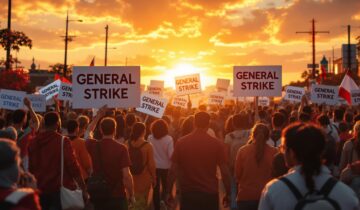Coordinated individual non-participation is the Number 1 form of General Strike
A mass movement of coordinated individual non-participation refers to a collective action where a large number of people choose to refrain from participating in certain activities, events, or systems in a coordinated way. This could be done as a form of protest, resistance, or to bring attention to a particular cause or issue. This collective action or non-action works as a general strike.
In this scenario, each individual makes a personal choice not to participate, but their actions are unified by a common goal. Unlike a traditional protest where people might physically gather or demonstrate, this type of movement relies on the collective power of non-participation—such as boycotts, strikes, or social media campaigns—where the absence of involvement sends a message of discontent or demands change.
The effectiveness of this type of movement comes from the sheer number of people participating in the non-participation, making it difficult for the targeted system or institution to function as usual, leading to possible political, social, or economic pressure.Coordinated individual non-participation —whether it’s targeting a specific company, industry, or the economy as a whole—requires a series of deliberate and strategic actions. While individual non-participation may seem like small actions on their own, when coordinated effectively, they can send a powerful message and create significant pressure for change.
Here are several actions individuals can take:
1. Boycott Specific Products or Services
- Selective Consumer Choices: Individuals can stop purchasing goods or services from a targeted company. For example, people might avoid products from a company known for unethical labor practices, environmental harm, or unfair pricing.
- Publicize the Boycott: Spread awareness of the boycott through social media, word of mouth, or flyers. The goal is to build momentum and encourage others to stop supporting the company as well.
2. Withdraw from Labor or Commercial Transactions
- Strike (or Partial Strike): Workers can refuse to engage in certain activities within their job, or refuse to work altogether. This might mean not showing up for work, refusing to perform certain tasks, or reducing productivity.
- Disrupt Supply Chains: Those in industries where they can influence supply chains (e.g., transportation, logistics, or retail) can disrupt the flow of goods to hurt the targeted company’s economic standing without direct confrontation.
3. Divestment
- Withdraw Investments: Individuals can sell stocks or investments related to the targeted company or industry, putting financial pressure on them. This may also include divesting from certain sectors, like fossil fuels, if the goal is to change corporate behavior.
- Encourage Others to Divest: Coordinating with others to divest in collective action increases the financial pressure on a company or industry, demonstrating widespread discontent.
4. Reduce Economic Activity (General Strike)
- Work Stoppage: Coordinated non-participation in the economy could mean going on strike, or collectively reducing participation in work for a defined period (even one day), to disrupt economic activity.
- Avoid Purchasing Goods and Services: Encourage mass participation in reducing consumption for a day or longer, such as “buy nothing” days or weeks, where individuals intentionally reduce their economic footprint.
5. Public Shaming and Awareness Campaigns
- Social Media Campaigns: Use platforms like Twitter, Instagram, or TikTok to spread awareness, encourage others to boycott, and hold companies accountable. Hashtags, viral content, or informational posts can draw attention to a cause.
- Petitions and Open Letters: Create petitions or open letters that individuals can sign to publicly express their non-participation and demands.
- Digital and Physical Signage: People can place stickers, posters, or digital banners in public spaces (with permission) to raise awareness about the target company’s unethical practices.
6. Coordinated Refusal to Pay Fees/Subscriptions
- Stop Paying for Services: If targeting a company that relies on subscriptions (like Netflix, gyms, or utility providers), individuals can collectively decide to cancel their subscriptions to send a financial message.
- Refuse to Pay Bills or Fees: If a company or institution is exploiting consumers or workers, a mass refusal to pay bills can be another form of economic resistance.
7. Refuse to Support Political Donations or Lobbying Efforts
- Revoke Financial Support: Individuals can pledge to stop donating to political candidates, lobbying groups, or causes that support companies or industries causing harm.
- Organize a Pledge: Create a public pledge for others to commit to withholding financial contributions to these political entities or organizations.
8. Reduce Consumerism and Buy from Ethical Alternatives
- Conscious Consumerism: Redirect purchasing power toward ethical businesses, local enterprises, cooperatives, or sustainable options. This sends a message that people are willing to change their buying habits to support alternatives that align with their values.
- Support Community-Owned Businesses: Instead of spending money with large corporations, individuals can invest in local businesses and cooperatives that align with the ethical principles of the movement.
9. Publicize Individual Non-participation
- Share Your Actions: Post your non-participation actions on social media or in community forums to inspire others. Personal testimonies and collective action amplify the impact of individual non-participation.
- Collective Actions in Specific Communities: Organize local events such as “buy nothing” days, community protests, or awareness gatherings to encourage others to join the non-participation effort.
10. Utilize Digital Non-participation
- Boycott Digital Platforms: If the target is a company that operates primarily in the digital space (such as a tech company or a social media platform), individuals can refuse to use their platforms, apps, or services.
- Avoid Digital Spending: Avoid spending money on digital goods, services, or subscriptions offered by the company you’re targeting.
11. Organize Flash Protests or Quiet Resistance
- Silent Protests: Organize flash protests or moments of silence at workplaces, public spaces, or via digital platforms where individuals display a message of non-participation without engaging in disruptive or violent actions.
- Online Petitions and Actions: Initiate and spread digital petitions, boycotts, and other forms of online resistance to create awareness and rally individuals to collectively withdraw from supporting companies.
12. Mutual Aid and Solidarity
- Create Support Networks: Provide mutual aid and support to those affected by a targeted company’s actions. For example, if workers are struggling after a strike, mutual aid funds or support networks can help ease the financial burden while they take collective action.
- Solidarity Actions: Organize in solidarity with other workers, communities, or organizations to show that non-participation is a shared and collective action.
Challenges to Consider
- Coordinating Non-participation: Organizing large-scale individual non-participation can be challenging. Effective communication and coordination through social media, community networks, or even encrypted communication channels will be critical.
- Repercussions: Be prepared for potential consequences, such as job loss or retaliation. Having a legal or community support network will be essential.
- Sustained Effort: Non-participation needs to be sustained over time to have a meaningful impact, whether it’s a boycott, strike, or other form of resistance. Building community support and maintaining momentum are key factors for success.
Coordinated individual non-participation can range from boycotting products and withdrawing investments to more direct actions like strikes or protests. The success of such a movement relies on building a network of people who share the same goals and are committed to making sacrifices for the collective good.
Check out generalstrike.info to find out about upcoming events you may want to earn more about.



 No products in the cart.
No products in the cart. 